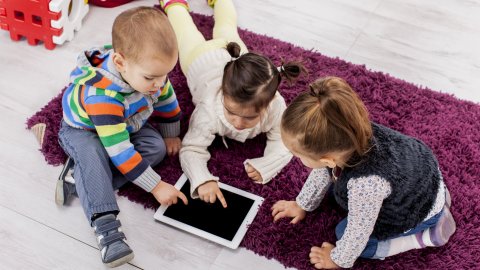Tablets, Smartphones May Interfere with Children’s Social Development

We’ve all seen it at restaurants before: parents propping their smartphones or tablets in front of their toddlers to pacify them long enough to get through the meal. It’s a wonder we have pacifiers anymore. However, Joanna Walters from The Guardian highlights a new study that speculates on the detrimental effects this kind of distraction may have on a child’s ability to learn self-control.
The researchers ponder:
“If these devices become the predominant method to calm and distract young children, will they be able to develop their own internal mechanisms of self-regulation?”
Gadgets and tablets are still relatively new. Psychologists and scientists are making discoveries on how this technology impacts our day-to-day life and our development as functioning human beings, seemingly, every day. However, tablets aren’t just portable televisions; there are games and interactive media where children can learn. But Jenny Radesky, a clinical instructor in Developmental-Behavioral Pediatrics at Boston University, doesn’t see the difference. She said in a statement:
“It has been well-studied that increased television time decreases a child’s development of language and social skills. Mobile media use similarly replaces the amount of time spent engaging in direct human-human interaction.”
The findings were published in the journal Pediatrics, where researchers suggest parents opt for person-to-person interaction over media (interactive or not). Radesky voices her concern over the use of gadgetry as a substitute for learning, as she fears it could impair a child’s ability to empathize and problem-solve—social nuances that are learned during unstructured play.
There’s research that shows educational television and interactive media can help a child learn vocabulary and reading, but only once they begin to approach school age. Radesky suggests:
“At this time, there are more questions than answers when it comes to mobile media. Until more is known about its impact on child development quality family time is encouraged, either through unplugged family time, or a designated family hour.”
Read more at The Guardian.
Photo Credit: Shutterstock





